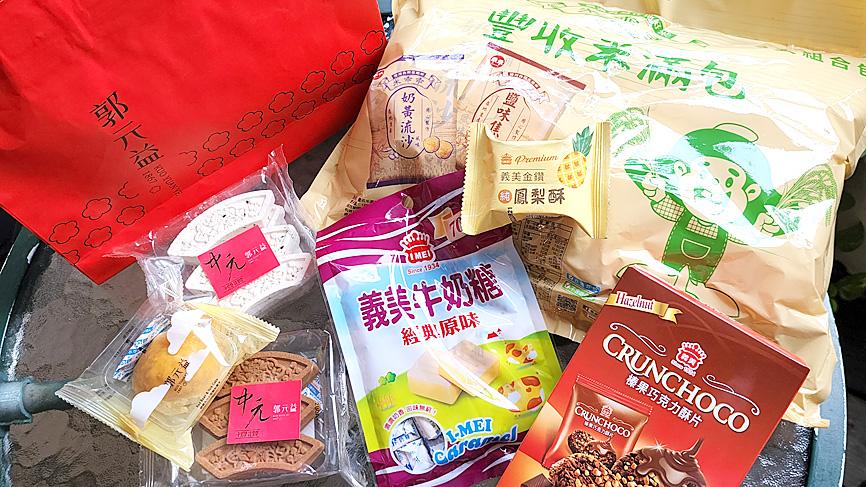China’s customs administration late on Monday announced bans on more than 100 Taiwanese food brands ahead of a visit by US House of Representatives Speaker Nancy Pelosi to Taiwan.
Beijing said that the blacklisted exporters — which include tea, honey and seafood producers — failed to renew their export registration and could therefore only sell their products until the end of this month.
The exporters may submit additional documents this month, Food and Drug Administration Director Wu Shou-mei (吳秀梅) said, adding that the agency would help them complete their registrations.

Photo: CNA
The bans might be politically motivated, as Taiwanese manufacturers were treated differently than those from other countries, she said.
Exporters from other countries can upload their registration documents online by June next year, while Taiwanese exporters had to submit the paperwork by June this year, she added.
She condemned the tight deadline, saying that “trade across the Taiwan Strait should not be conducted this way, as it needs time for communication.”
Council of Agriculture Minister Chen Chi-chung (陳吉仲) said the agency would soon announce remedial measures to help the exporters.
Taiwanese companies have registered 3,200 food products for export to China, 2,066 of which have been marked as “import suspended,” including those from Kuo Yuan Ye Corp (郭元益), Yu Jan Shin (裕珍馨), Kuai Kuai Co (乖乖), Imei Foods Co (義美食品), Chiate Bakery (佳德) and Kuang Ta Hsiang Foodstuffs Co (廣達香).
The banned manufacturers mainly produce prepared and processed foods such as pastries, whose export value to China and Hong Kong made up only 0.1 percent, or US$650 million, of Taiwan’s total exports, Ministry of Finance data showed.
As exports of food and drinks to China had already fallen due to the COVID-19 pandemic, the ban would have a greater effect on fishing boats and seafood exporters, a Ministry of Economic Affairs official said.
Taiwan last year exported US$44 million worth of pastries to China, but only US$10 million during the first half of this year, government data showed.
On the other hand, the total value of Taiwan’s seafood exports to China last year reached US$280 million and tea leaf exports reached US$31.67 million, while honey exports were only US$35,000.
Fifty-four fishing boats were asked to submit additional documents and the importation of more than 600 of their products was suspended, sources familiar with the issue said, adding that the bans prohibit the majority of Taiwanese seafood, tea and honey from reaching the Chinese market.
Beijing also requires fishing boats to submit Hazard Analysis and Critical Control Point (HACCP) certification, Wu said.
Fisheries Agency Director-General Chang Chih-sheng (張致盛) said that affected vessels include deep-sea fishing boats and offshore fishing boats, adding that the agency would help them obtain HACCP certification if they plan to export to China.
China last year suspended imports of Taiwanese pineapples, custard apples and wax apples, and in June banned grouper imports, claiming that it found pests and excessive levels of prohibited chemicals in the products.
Additional reporting by Cheng Chi-fang,
Huang Pei-chun and CNA

POSITIVE DEVELOPMENT: Japan and the US are expected to hold in-depth discussions on Taiwan-related issues during the meeting next month, Japanese sources said The holding of a Japan-US leaders’ meeting ahead of US President Donald Trump’s visit to China is positive news for Taiwan, former Japan-Taiwan Exchange Association representative Hiroyasu Izumi said yesterday. After the Liberal Democratic Party’s landslide victory in Japan’s House of Representatives election, Japanese Prime Minister Sanae Takaichi is scheduled to visit the US next month, where she is to meet with Trump ahead of the US president’s planned visit to China from March 31 to April 2 for a meeting with Chinese President Xi Jinping (習近平). Japan and the US are expected to hold in-depth discussions on Taiwan-related issues during the

‘LIKE-MINDED PARTNER’: Tako van Popta said it would be inappropriate to delay signing the deal with Taiwan because of China, adding he would promote the issue Canadian senators have stressed Taiwan’s importance for international trade and expressed enthusiasm for ensuring the Taiwan-Canada trade cooperation framework agreement is implemented this year. Representative to Canada Harry Tseng (曾厚仁) in an interview with the Central News Agency (CNA) said he was increasingly uneasy about Ottawa’s delays in signing the agreement, especially as Ottawa has warmed toward Beijing. There are “no negotiations left. Not only [is it] initialed, we have three versions of the text ready: English, French and Mandarin,” Tseng said. “That tells you how close we are to the final signature.” Tseng said that he hoped Canadian Prime Minister Mark Carney

President William Lai (賴清德) yesterday bestowed one of Taiwan’s highest honors on Saint Vincent and the Grenadines (SVG) Ambassador Andrea Clare Bowman in recognition of her contributions to bilateral ties. “By conferring the Order of Brilliant Star with Grand Cordon on Ambassador Bowman today, I want to sincerely thank her, on behalf of the Taiwanese people, for her outstanding contribution to deepening diplomatic ties between Taiwan and SVG,” Lai said at a ceremony held at the Presidential Office in Taipei. He noted that Bowman became SVG’s first ambassador to Taiwan in 2019 and

A man walks past elementary school artworks at the Taipei Lantern Festival in Ximen District yesterday, the first day of the event. The festival is to run from 5pm to 10pm through March 15.